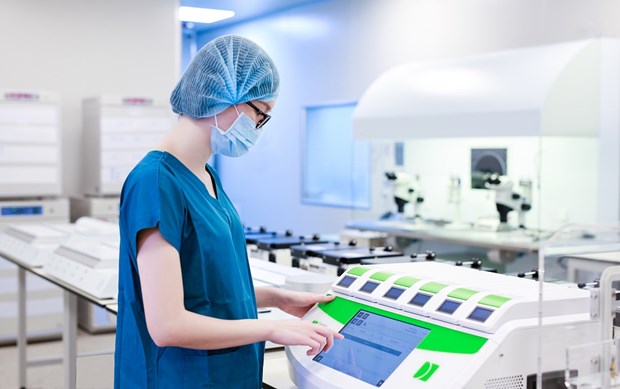 Society
Society

Updates on the country's AI research, development and use were introduced at a seminar held last week, attended by medical and tech experts.

|
| Time-lapse technology for embryo culture and selection combined using artificial intelligence software are used in Hà Nội's Vinmec Hospital to select good embryos, increasing the likelihood of IVF conception. Photo vietnamplus.vn |
HÀ NỘI — Việt Nam’s health care sector is stepping up the use of artificial intelligence (AI) to improve service quality.
Updates on the country's AI research, development and use were introduced at a seminar held last week, attended by medical and tech experts.
The online seminar is part of AI4VN Program organised by the Ministry of Science and Technology, the Ministry of Planning and Investment, HCM City People’s Committee, online newspaper VnExpress, and Sun Bright Art Creative and Event JSC, in co-operation with the Aus4Innovation programme, Australian Embassy in Vietnam, and Hanoi University of Science and Technology.
Deputy Minister of Science and Technology Bùi Thế Duy said the development of AI, digital technology and big data created “miracles” in various fields.
“In the health care sector, human’s knowledge and the accumulated knowledge and experiences of doctors and health professionals are saved thanks to big data. With algorithms and computing technologies, the data is processed to become tools assisting doctors and health care workers to provide better health services,” Duy said.
He said that Việt Nam expected high-tech developers to become more interested in the medical sector and health professionals to become more engaged in using digital technologies and big data in their work.
“The application of AI, digital technologies and digital transformation is very meaningful to disease prevention, control and treatment, particularly when COVID-19 is still going on, at least by year-end,” Duy said.
David Hansen, CEO of the Australian e-Health Research Centre, Australia’s first and largest e-research hub, said the hub had been providing an evidence base for the digital transformation of health care.
AI and digital technology had helped increase health care service quality, he said, giving examples like machine learning on retinal images to enable telehealth screening for eye diseases, for examples, glaucoma and diabetic retinopathy.
Machine learning can be used to understand the movement patterns of aged Australians living alone, alerting carers if functional independence declines over time, he said.
Associate Professor Nguyễn Viết Nhung, director of the National Lung Hospital and chairman of Việt Nam Lung Association, said he had been spending years studying the use of AI to diagnose tuberculosis and lung disease.
The science ministry has tasked the hospital with utilising technology to screen and detect tuberculosis patients with radiography, Nhung said.
Việt Nam aimed to have zero cases of tuberculosis by 2030 and key to achieving that goal was improving its ability to detect the disease early and deliver treatment timely, Nhung said, adding that modern technologies could help reduce 70 per cent of TB cases within four years.
AI would help screen with X-rays, predict spatial epidemiology, support patient compliance with treatment, and support the management of drug side effects, Nhung said, adding that the final goal is to detect TB cases early and treat them completely.
AI would further enhance doctors’ diagnosis ability, he said.
"AI would help relieve the burden on humans while increasing accuracy and ensuring no case slips by while using lung radiography," he said.
According to Trần Thị Mai Oanh, director of Health Strategy and Policy Institute under the Ministry of Health, in Việt Nam, AI is applied in four key fields – diagnosis, treatment, management of health history data and training.
Vingroup’s Big Data Institute has been developing an AI application to diagnose lung diseases with chest X-ray images and breast cancer with breast X-ray images. The application is being trialled at Military Hospital 108, the Medical University’s Hospital and Vinmec.
Oanh said AI could be applied widely, especially to help people record their own health conditions, reminding people to take medicine and exercise, and provide early warnings to detect diseases like cardiovascular issues or cancer.
“When it comes to AI application in the health care sector, its code of ethics is needed regarding the protection of privacy and personal information like their health conditions,” Oanh said.
"Another issue is to ensure safety for patients if robots are used to deliver services as it's possible for programmed robots to have errors," Oanh said, adding that in such cases, legal regulations on compensation needed to be clarified.
“How much AI applications can be used to deliver treatment services is also a key issue that decides the treatment’s effectiveness and responsibility,” Oanh said.
Besides an improved legal framework, qualified input data would be needed to ensure reliable and exact diagnosis and treatment, she said.
Prof and Dr Nguyễn Thanh Thủy, deputy chief of the national programme supporting the research, development and application of technologies in the Fourth Industrial Revolution, said that three years ago, the Ministry of Science and Technology launched a master plan on AI development as well as studies on AI use in the health care sector.
“Việt Nam now has advantages to apply AI in health care including high demand, available input health data and human resources with people who are committed and determined to try,” Thuỷ said. — VNS




